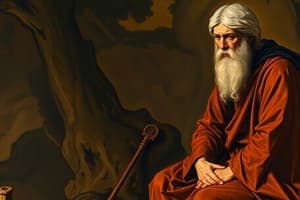Podcast
Questions and Answers
Questions are hidden until you start the quiz
Flashcards are hidden until you start studying
Study Notes
Unveiling the Themes, Authorship, History, and Theology of Deutero Isaiah
Deutero Isaiah, also known as Second Isaiah, is a collection of poetic prophecies found in the Hebrew Bible, specifically Isaiah chapters 40-55. These passages have been the subject of intense scholarly debate, revealing a complex tapestry of themes, authorship, historical setting, and theology.
Themes
During the exile of the Israelites in Babylon, Deutero Isaiah spoke of a new and hopeful future for the people of Israel. Themes prevalent in these chapters include:
- Consolation and comfort: The prophecies offer a message of hope, revealing that God is not abandoning his people and that they will be redeemed.
- Restoration: Second Isaiah envisions a return of the exiles and their reconstruction in the land of Israel.
- Rejection of idolatry: The prophet rebukes the Israelites for their reliance on false gods and calls them to worship the one true God.
- Universal salvation: The prophecies speak of the inclusion of the gentiles in God's plan for salvation.
Authorship
There is no clear consensus on the identity of Second Isaiah's author. Traditionally, the prophecies are attributed to Isaiah of Jerusalem, who lived during the sixth century BCE. However, some scholars argue for multiple authors or a community of prophets contributing to the text over time.
Historical Setting
Second Isaiah arose during the period of the Babylonian exile, as Israelites were being held captive in Babylon after the destruction of Jerusalem. The prophecies are believed to have been compiled during the reign of Cyrus the Great, when the Persian Empire allowed the Israelites to return to their homeland.
Theology
Deutero Isaiah sheds light on aspects of theological doctrine, including:
- The concept of deity: The prophet emphasizes the uniqueness of God and the necessity of monotheism.
- God's sovereignty: Second Isaiah affirms that God is the ultimate ruler of the universe and has the power to save his people.
- Redemption: The prophecies reveal that God is actively involved in his people's salvation, particularly in the context of the exile.
In sum, Deutero Isaiah is a pivotal text in the Hebrew Bible, offering complex and multifaceted insights into themes, authorship, history, and theology. These prophecies continue to inspire and challenge readers, inviting them to engage with the timeless message of hope and redemption for God's people.
Studying That Suits You
Use AI to generate personalized quizzes and flashcards to suit your learning preferences.
Description
Test your knowledge about the themes, authorship, historical setting, and theology of Deutero Isaiah, a collection of prophecies found in the Hebrew Bible. Explore the profound messages of hope, restoration, monotheism, and salvation conveyed in the prophecies.

